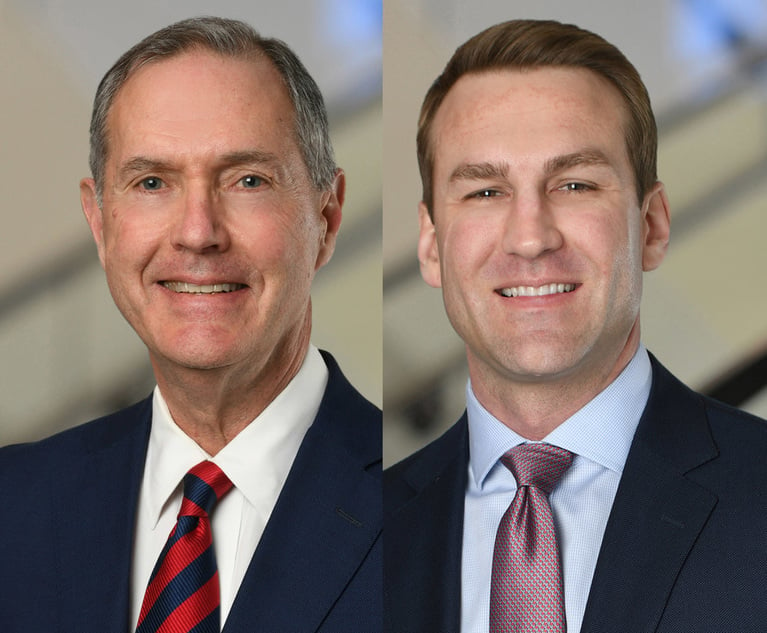Court: Case Against Ex-officer Who Shot Nude Man May Proceed
Unnecessary people in grand jury room does not harm indictment, state Supreme Court says.
October 16, 2017 at 01:57 PM
6 minute read
 Georgia Supreme Court building. John Disney / ALM
Georgia Supreme Court building. John Disney / ALM Georgia's highest court ruled Monday the prosecution of a white former Atlanta-area police officer who fatally shot an unarmed, naked, mentally ill black veteran may go forward.
The Georgia Supreme Court rejected arguments by Robert Olsen's attorneys that the charges against him should be dismissed because the principle of grand jury secrecy had been violated by the presence of extra, unnecessary people during the grand jury proceedings.
Olsen, a DeKalb County police officer at the time, shot Anthony Hill on March 9, 2015, while responding to a call about a naked man behaving erratically outside a suburban Atlanta apartment complex.
A grand jury indicted Olsen in January 2016 on charges of felony murder, aggravated assault, violation of oath of office and making a false statement.
Olsen's attorneys in June 2016 filed a motion to dismiss the case, saying “unauthorized” people had been present in the grand jury room. During a hearing on the motion in September 2016, attorney Don Samuel said those included multiple people from the district attorney's office, an expert witness and a court reporter who didn't transcribe anything but a statement by the officer.
The presence of all those people, especially people from the district attorney's office, could have discouraged grand jurors from asking questions, Samuel said, though he made it clear that he did not believe anyone was purposely intimidating grand jurors.
DeKalb County Superior Court Judge J.P. Boulee ruled in October 2016 there aren't grounds under Georgia law to dismiss the indictment, but he allowed Olsen to appeal that decision to the high court.
“No unlawful conduct is shown in this case, and no prejudice is demonstrated by the manner in which the prosecutor conducted the evidentiary stage of the grand jury proceedings,” Georgia Supreme Court Justice Robert Benham wrote in the unanimous opinion Monday.
Benham wrote that unlike in federal grand jury proceedings where clear rules specify who may be present while evidence is presented, there are no such limitations under Georgia law or procedural rules. While the preservation of grand jury secrecy is well-recognized in Georgia, Benham wrote, the court didn't believe the need for grand jury secrecy was compromised in this case.
But Benham was careful to note that the opinion does not mean prosecutors may allow spectators — including journalists or school classes — to watch grand jury proceedings.
Prosecutors should “take care to conduct grand jury proceedings in a manner that does not discourage witnesses from testifying fully and frankly, that protects against the risk that the accused might flee to avoid prosecution, and that ensures persons who are ultimately not indicted are not the subject of public ridicule,” the opinion said.
 Georgia Supreme Court building. John Disney / ALM
Georgia Supreme Court building. John Disney / ALM Georgia's highest court ruled Monday the prosecution of a white former Atlanta-area police officer who fatally shot an unarmed, naked, mentally ill black veteran may go forward.
The Georgia Supreme Court rejected arguments by Robert Olsen's attorneys that the charges against him should be dismissed because the principle of grand jury secrecy had been violated by the presence of extra, unnecessary people during the grand jury proceedings.
Olsen, a DeKalb County police officer at the time, shot Anthony Hill on March 9, 2015, while responding to a call about a naked man behaving erratically outside a suburban Atlanta apartment complex.
A grand jury indicted Olsen in January 2016 on charges of felony murder, aggravated assault, violation of oath of office and making a false statement.
Olsen's attorneys in June 2016 filed a motion to dismiss the case, saying “unauthorized” people had been present in the grand jury room. During a hearing on the motion in September 2016, attorney Don Samuel said those included multiple people from the district attorney's office, an expert witness and a court reporter who didn't transcribe anything but a statement by the officer.
The presence of all those people, especially people from the district attorney's office, could have discouraged grand jurors from asking questions, Samuel said, though he made it clear that he did not believe anyone was purposely intimidating grand jurors.
DeKalb County Superior Court Judge J.P. Boulee ruled in October 2016 there aren't grounds under Georgia law to dismiss the indictment, but he allowed Olsen to appeal that decision to the high court.
“No unlawful conduct is shown in this case, and no prejudice is demonstrated by the manner in which the prosecutor conducted the evidentiary stage of the grand jury proceedings,” Georgia Supreme Court Justice
Benham wrote that unlike in federal grand jury proceedings where clear rules specify who may be present while evidence is presented, there are no such limitations under Georgia law or procedural rules. While the preservation of grand jury secrecy is well-recognized in Georgia, Benham wrote, the court didn't believe the need for grand jury secrecy was compromised in this case.
But Benham was careful to note that the opinion does not mean prosecutors may allow spectators — including journalists or school classes — to watch grand jury proceedings.
Prosecutors should “take care to conduct grand jury proceedings in a manner that does not discourage witnesses from testifying fully and frankly, that protects against the risk that the accused might flee to avoid prosecution, and that ensures persons who are ultimately not indicted are not the subject of public ridicule,” the opinion said.
This content has been archived. It is available through our partners, LexisNexis® and Bloomberg Law.
To view this content, please continue to their sites.
Not a Lexis Subscriber?
Subscribe Now
Not a Bloomberg Law Subscriber?
Subscribe Now
NOT FOR REPRINT
© 2025 ALM Global, LLC, All Rights Reserved. Request academic re-use from www.copyright.com. All other uses, submit a request to [email protected]. For more information visit Asset & Logo Licensing.
You Might Like
View All
Law Firms Expand Scope of Immigration Expertise Amid Blitz of Trump Orders
6 minute read
Bass Berry & Sims Relocates to Nashville Office Designed to Encourage Collaboration, Inclusion
4 minute read
Gunderson Dettmer Opens Atlanta Office With 3 Partners From Morris Manning
3 minute read
Trending Stories
Who Got The Work
J. Brugh Lower of Gibbons has entered an appearance for industrial equipment supplier Devco Corporation in a pending trademark infringement lawsuit. The suit, accusing the defendant of selling knock-off Graco products, was filed Dec. 18 in New Jersey District Court by Rivkin Radler on behalf of Graco Inc. and Graco Minnesota. The case, assigned to U.S. District Judge Zahid N. Quraishi, is 3:24-cv-11294, Graco Inc. et al v. Devco Corporation.
Who Got The Work
Rebecca Maller-Stein and Kent A. Yalowitz of Arnold & Porter Kaye Scholer have entered their appearances for Hanaco Venture Capital and its executives, Lior Prosor and David Frankel, in a pending securities lawsuit. The action, filed on Dec. 24 in New York Southern District Court by Zell, Aron & Co. on behalf of Goldeneye Advisors, accuses the defendants of negligently and fraudulently managing the plaintiff's $1 million investment. The case, assigned to U.S. District Judge Vernon S. Broderick, is 1:24-cv-09918, Goldeneye Advisors, LLC v. Hanaco Venture Capital, Ltd. et al.
Who Got The Work
Attorneys from A&O Shearman has stepped in as defense counsel for Toronto-Dominion Bank and other defendants in a pending securities class action. The suit, filed Dec. 11 in New York Southern District Court by Bleichmar Fonti & Auld, accuses the defendants of concealing the bank's 'pervasive' deficiencies in regards to its compliance with the Bank Secrecy Act and the quality of its anti-money laundering controls. The case, assigned to U.S. District Judge Arun Subramanian, is 1:24-cv-09445, Gonzalez v. The Toronto-Dominion Bank et al.
Who Got The Work
Crown Castle International, a Pennsylvania company providing shared communications infrastructure, has turned to Luke D. Wolf of Gordon Rees Scully Mansukhani to fend off a pending breach-of-contract lawsuit. The court action, filed Nov. 25 in Michigan Eastern District Court by Hooper Hathaway PC on behalf of The Town Residences LLC, accuses Crown Castle of failing to transfer approximately $30,000 in utility payments from T-Mobile in breach of a roof-top lease and assignment agreement. The case, assigned to U.S. District Judge Susan K. Declercq, is 2:24-cv-13131, The Town Residences LLC v. T-Mobile US, Inc. et al.
Who Got The Work
Wilfred P. Coronato and Daniel M. Schwartz of McCarter & English have stepped in as defense counsel to Electrolux Home Products Inc. in a pending product liability lawsuit. The court action, filed Nov. 26 in New York Eastern District Court by Poulos Lopiccolo PC and Nagel Rice LLP on behalf of David Stern, alleges that the defendant's refrigerators’ drawers and shelving repeatedly break and fall apart within months after purchase. The case, assigned to U.S. District Judge Joan M. Azrack, is 2:24-cv-08204, Stern v. Electrolux Home Products, Inc.
Featured Firms
Law Offices of Gary Martin Hays & Associates, P.C.
(470) 294-1674
Law Offices of Mark E. Salomone
(857) 444-6468
Smith & Hassler
(713) 739-1250






